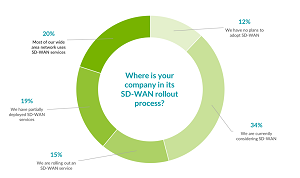News
Networking Survey: SD-WAN Is Entry Point to Huge Software-Defined Transition
A new survey by Juniper Networks reveals a software-defined future for the industry, with software-defined wide-area-networks (SD-WAN) serving as the entry point for many organizations.
The company polled some 500 IT decision-makers to gather information on their software-defined networking (SDN) journeys, exploring benefits and the effect of other technological influences, such as artificial intelligence (AI).
The data reveals the SDN transition is huge -- with 98 percent of respondents indicating that they're using or considering an SDN solution -- with the burgeoning SD-WAN movement providing an easy onramp.
"Drilling further into enterprise journeys we learned that, if SDN is the destination, SD-WAN is the entry point," Juniper said in a June 6 blog post. "The majority, 54 percent, have rolled out or are in the process of rolling out SD-WAN solutions, while an additional 34 percent have it under current consideration."
It isn't a smooth journey, though, as findings also included these Juniper comments:
- There is a wide gap between the reality of today's networks and the cohesive and centrally-managed model of the future.
- We're still a long way from a future ruled by SDN, with 87 percent of businesses still doing most or some of their network management at the device level.
 [Click on image for larger view.] SD-WAN Rollouts (source: Juniper Networks).
[Click on image for larger view.] SD-WAN Rollouts (source: Juniper Networks).
Factors that might smooth the journey include AI and some interesting SDN perceptions regarding security and impact of automation on current jobs, with Juniper commenting:
- We believe AI is a driving element in this operational journey. The AI-driven enterprise transforms the network from reactive to proactive and ultimately to adaptive and predictive.
- Many enterprises see security -- not speed -- as the biggest consequence of not making this transition in the next five years, with nearly 40 percent identifying the inability to quickly address new threats as one of their main concerns.
- While automation is often considered a threat, many IT professionals are actually viewing it as an opportunity. Spending less time on administrative tasks frees up time to focus on strategic initiatives and innovation. It would seem that the rumors of automation killing off the IT workforce might be overstated. Automation is about enhancing productivity and making those workers more effective - not more absent.
"Whether you find these results surprising or as expected, they clearly show that a transition is underway," the company concluded, noting that AI will play a significant role. "From abstracted controls, to automated workflows and AI-driven experience and insights, we're quickly moving away from the days of device-by-device management and into a future where security protections learn as fast as threats emerge and networks adapt to assure the best user experience even amid dynamic conditions. The key to unlocking the future of the network is AI."
About the Author
David Ramel is an editor and writer at Converge 360.